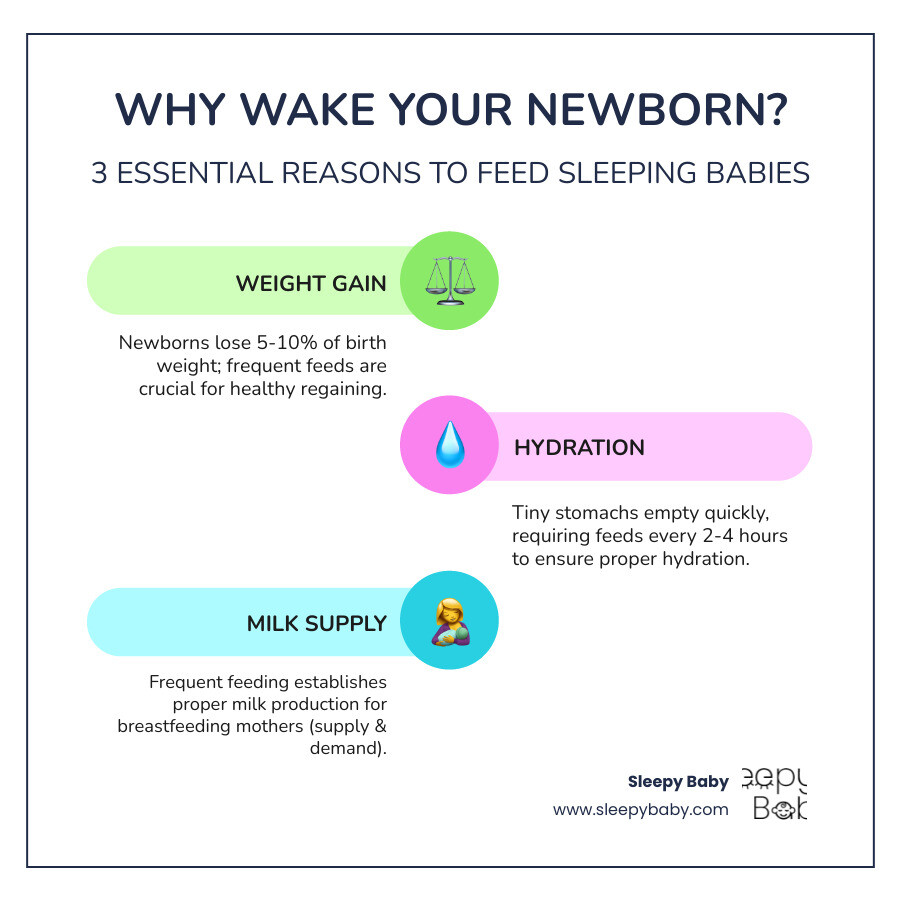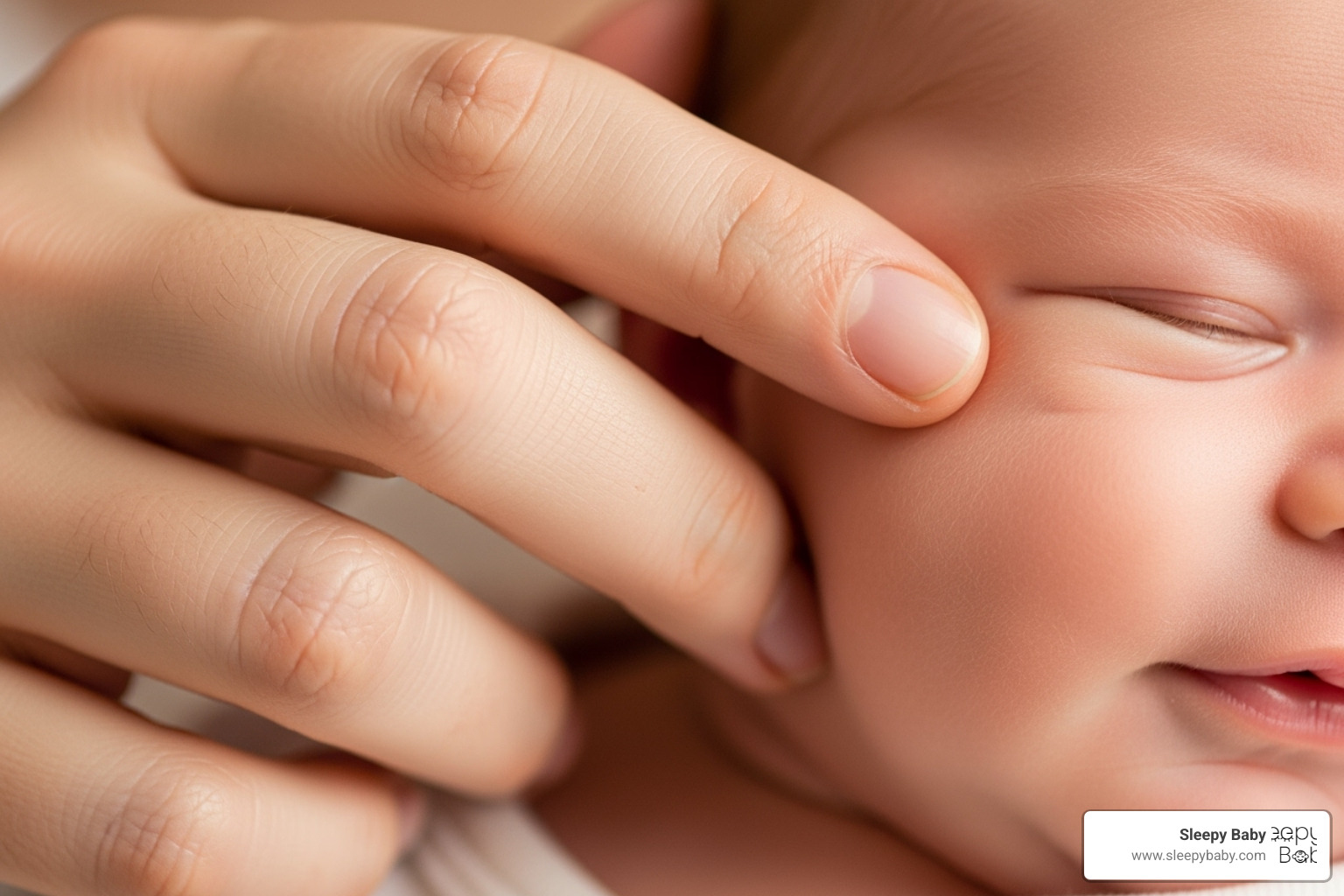
















Should I wake my newborn to feed is one of the most common questions new parents ask. While the advice to "never wake a sleeping baby" sounds logical, it simply doesn't apply to newborns in their first few weeks.
Quick Answer: Yes, you should wake your newborn to feed in these situations:
Your newborn's tiny stomach empties quickly and needs frequent refueling. Most newborns lose 5-10% of their birth weight in the first few days, making consistent feeding crucial for healthy growth. The early weeks are also critical for establishing your milk supply if you're breastfeeding, as frequent feeding signals your body to produce the right amount of milk.
This guide will walk you through why, when, and how to wake your newborn for feeds, and when you can finally let them sleep.

A newborn's primary jobs are eating, sleeping, and growing, and their rapid growth requires constant fuel. Waking a sleeping newborn for feeds is essential in the early weeks for several key reasons.
Newborns have tiny stomachs—about the size of a marble on day one—and digest milk quickly, especially breast milk. This necessitates frequent, small feedings. It's also normal for newborns to lose 5–10% of their body weight after birth, making consistent feeding critical to regain that weight, a key early milestone. The importance of frequent feedings for newborns is paramount during this period.
Beyond weight gain, waking your newborn to feed helps prevent potential complications like:
The first two weeks are a critical period for establishing feeding patterns. The primary goal is for your baby to regain their birth weight. Your pediatrician will monitor this closely. Newborns can be very sleepy, sometimes due to the birth experience, making them less likely to wake for feeds on their own. This makes it crucial for parents to initiate feedings. You can learn more about Understanding Newborn Sleep Patterns to steer this phase.
For breastfeeding mothers, the early weeks establish milk supply. Breast milk production works on a supply-and-demand basis: the more milk is removed, the more your body is signaled to produce. If a newborn sleeps for long stretches and misses feeds, it can negatively impact long-term milk production. Waking a breastfed newborn every 2–3 hours helps build a strong foundation for your breastfeeding journey and prevent issues like engorgement. We have many Tips for Successful Breastfeeding to support you.

Figuring out your baby's feeding rhythm can feel like a puzzle. Newborns often have day/night confusion and wake frequently to eat, which is completely normal. While "on-demand" feeding (responding to hunger cues) is recommended, this often means you'll need to wake a very young newborn if they've slept too long. Due to their rapid growth and small stomachs, frequent feedings are essential. You can learn more about How Often and How Much Should Your Baby Eat? from trusted resources.
While every baby is unique, here are some general guidelines for when should I wake my newborn to feed:
Most newborns need 8 to 12 feedings a day. In the first few weeks, or until they've regained their birth weight, they should not go more than 4-5 hours without eating. If your baby sleeps longer than this, it's time to gently rouse them. For more details, see our Newborn Feeding Schedule: What to Expect guide.

Learning your baby's hunger cues is a key parenting skill. Responding to early signs makes feeding a calmer experience. Crying is a late sign of hunger, and a distressed baby may have trouble feeding. Our Signs Your Newborn is Hungry guide has more details, but here’s a quick overview:
| Early Hunger Cues | Late Hunger Cues |
|---|---|
| Stirring, waking up, eyes fluttering | Frantic movement of head and arms |
| Opening mouth, licking lips, smacking | Intense, distressed crying |
| Turning head side to side (rooting) | Body stiffening or arching |
| Bringing hands or fists to mouth | |
| Fussing or becoming more alert |

We've established that you should wake your newborn to feed, but the thought of rousing a peaceful baby can be daunting. The key is to be gentle, gradually nudging them awake so they are calm and ready to feed. The best time to wake them is during active (REM) sleep, when you might see their eyelids flutter or their limbs twitch, as they are already closer to wakefulness.
Here are some gentle techniques to encourage your sleepy newborn to stir for a feed:
Keeping a newborn awake for an entire feeding can be a challenge. Here’s how to encourage a full feed:
The time will come when you can finally let your sleeping baby lie. As your baby grows, their stomach gets bigger and they become more efficient feeders, allowing for longer stretches of sleep. This transition is gradual, and it's crucial to consult your pediatrician before changing your baby's feeding schedule. They can best assess your baby's growth and ensure a healthy transition.
You can typically stop waking your newborn for feeds once they meet these criteria:
Once these conditions are met, you can often let your baby sleep for one longer stretch at night (typically 4–5 hours). A helpful guideline is the "age-in-weeks + 1 hour" rule for the maximum sleep stretch. For example, a 3-week-old might sleep for a 4-hour stretch.
As you move past the newborn feeding phase, you can gently encourage healthy sleep habits. A simple routine helps your baby differentiate day from night. Keep night feeds quiet and dark, and expose them to natural light and household sounds during the day.
To support the journey towards more independent sleep, Sleepy Baby can help. Our intelligent sleep aids are designed for this transition. Rhythmic patting devices mimic a caregiver's comforting touch, offering hands-free soothing to ease your baby into deeper sleep. We also incorporate white noise. While some machines can be unsafe, modern, safety-rated devices deliver white noise at safe, low-decibel levels, sometimes from a device placed on the baby's chest. This combination of rhythmic patting and safe white noise provides comfort and security, helping your baby consolidate sleep. For more tips, explore our articles on natural baby sleep aids and soothing sounds for babies. You can find even more info about our blog for further parenting tips.
As a new parent, it's normal to be hypervigilant, but it's important to know which signs are genuinely concerning. The question should I wake my newborn to feed becomes critical when health issues are a possibility. Normal newborn sleepiness is different from lethargy. A healthy sleepy baby will still respond to rousing and show interest in feeding, while a lethargic baby is extremely difficult to wake and shows little interest in eating. Trust your instincts—if something feels off, call your pediatrician.

Never hesitate to call your doctor for advice. Here are red flags that warrant an immediate call:
If you have a nagging feeling that something isn't right with your baby's feeding or sleep, don't dismiss it. For more guidance, see our resource on When to Call the Pediatrician for Your Newborn. It's always better to get reassurance than to wait and worry.
Navigating newborn sleep and feeding brings up many questions. It's normal to wonder about the big debate: should I wake my newborn to feed? Here are some common questions from new parents.
Generally, no, not for a wet diaper unless it's very full or causing a rash. A baby's sleep is precious. However, you should always change a soiled (poopy) diaper. The best strategy is to combine diaper changes with feeding times to minimize disruption. When you do a nighttime change, keep the environment calm, dark, and quiet to help them go back to sleep easily.
This is very common. Newborns often have a strong suck-to-sleep association. To encourage a full feed, try gentle waking techniques like tickling their feet, rubbing their cheek, or burping them mid-feed. Switching breasts (if breastfeeding) can also re-engage them. A good latch is key, as an inefficient latch is tiring. Aim for 10-15 minutes of active sucking. If you're concerned about their intake, talk to your pediatrician or a lactation consultant.
In the first few weeks, yes, if it means they are missing essential feedings for growth, hydration, and stable blood sugar. If your baby regularly sleeps for more than 4-5 hours, is difficult to rouse, or seems lethargic, it could signal an issue like jaundice or low caloric intake. It's important to distinguish normal sleepiness from true lethargy. If you're struggling to wake your baby, discuss it with your pediatrician. Once your doctor gives the all-clear, longer sleep stretches are a welcome milestone.
Asking should I wake my newborn to feed shows how much you care. As we've explored, for the first few weeks, the answer is a clear "yes!" Waking your newborn is crucial for them to regain birth weight, stay hydrated, maintain stable blood sugar, and, for breastfeeding moms, establish a strong milk supply. Remember to feed every 2–3 hours for breastfed babies and 3–4 hours for formula-fed babies, not letting them go more than 4–5 hours without a feed until your pediatrician approves.
This intensive phase doesn't last forever. As your baby grows and gains weight consistently, you can begin to let them sleep for longer stretches, with your doctor's guidance. Soon enough, "never wake a sleeping baby" can become your new rule.
The fourth trimester is a journey of bonding and change. Caring for your baby is paramount, but so is your own well-being. When your baby's feeding is stable and you're ready to encourage longer, independent sleep, Sleepy Baby is here to help. Our intelligent sleep aids mimic your comforting touch with rhythmic patting and safe white noise, offering a hands-free way to soothe your baby into more consolidated sleep. This helps your baby feel secure while you reclaim much-needed rest.
You are doing an amazing job. Trust your instincts, lean on your healthcare team, and cherish these moments. For more gentle parenting tips, explore our blog for more parenting tips.